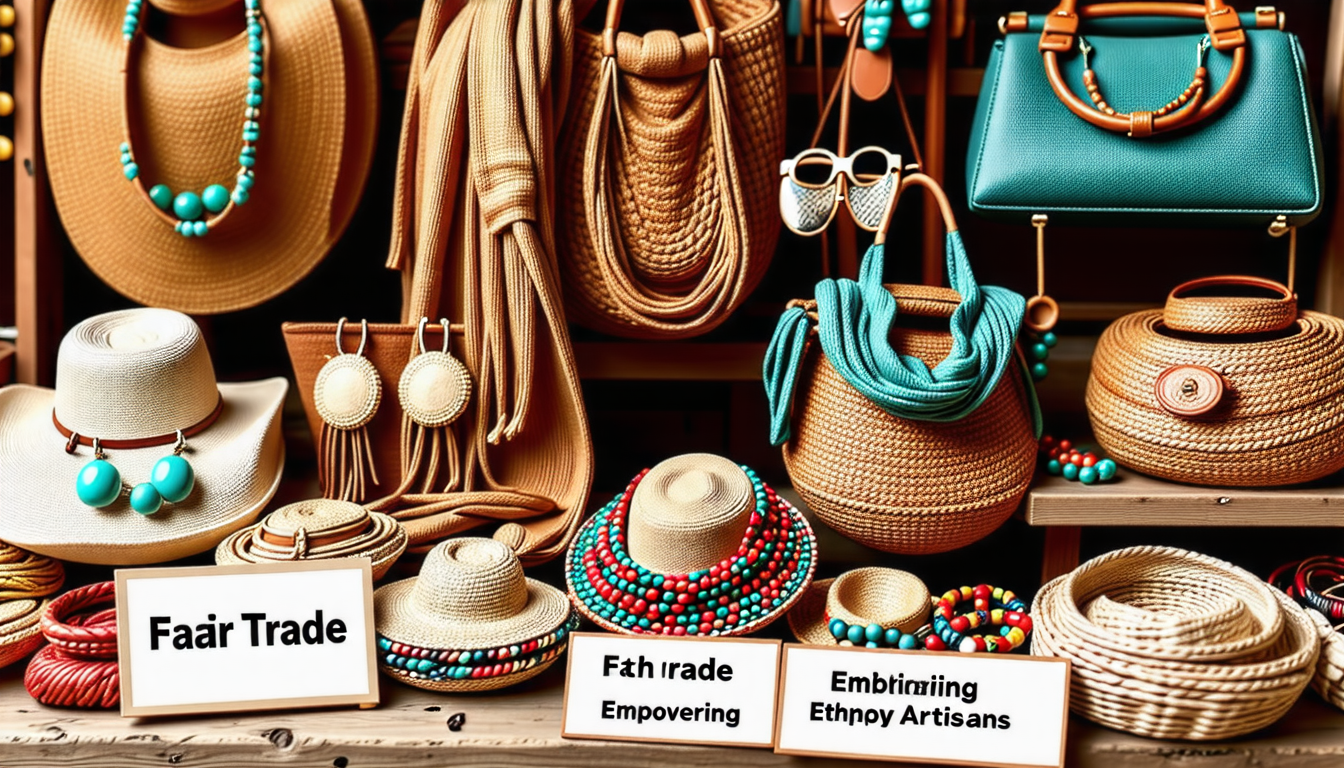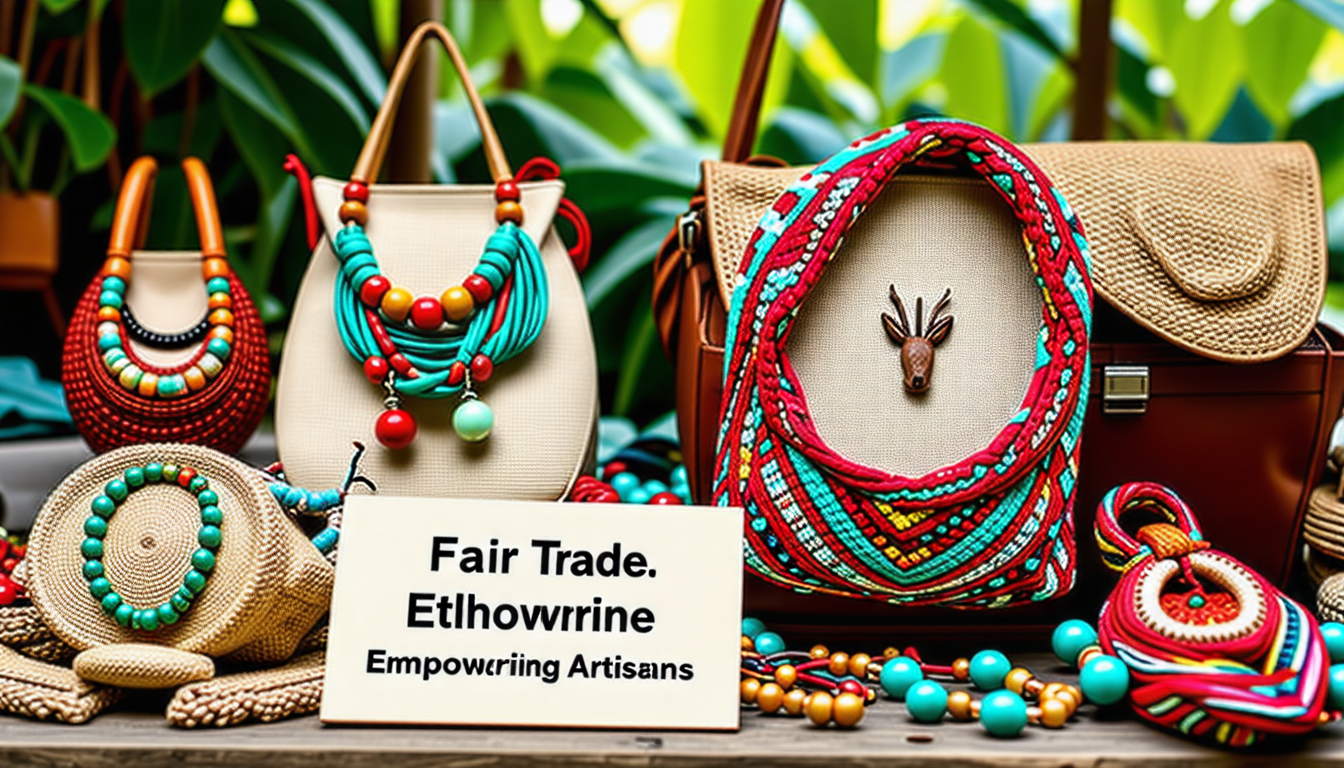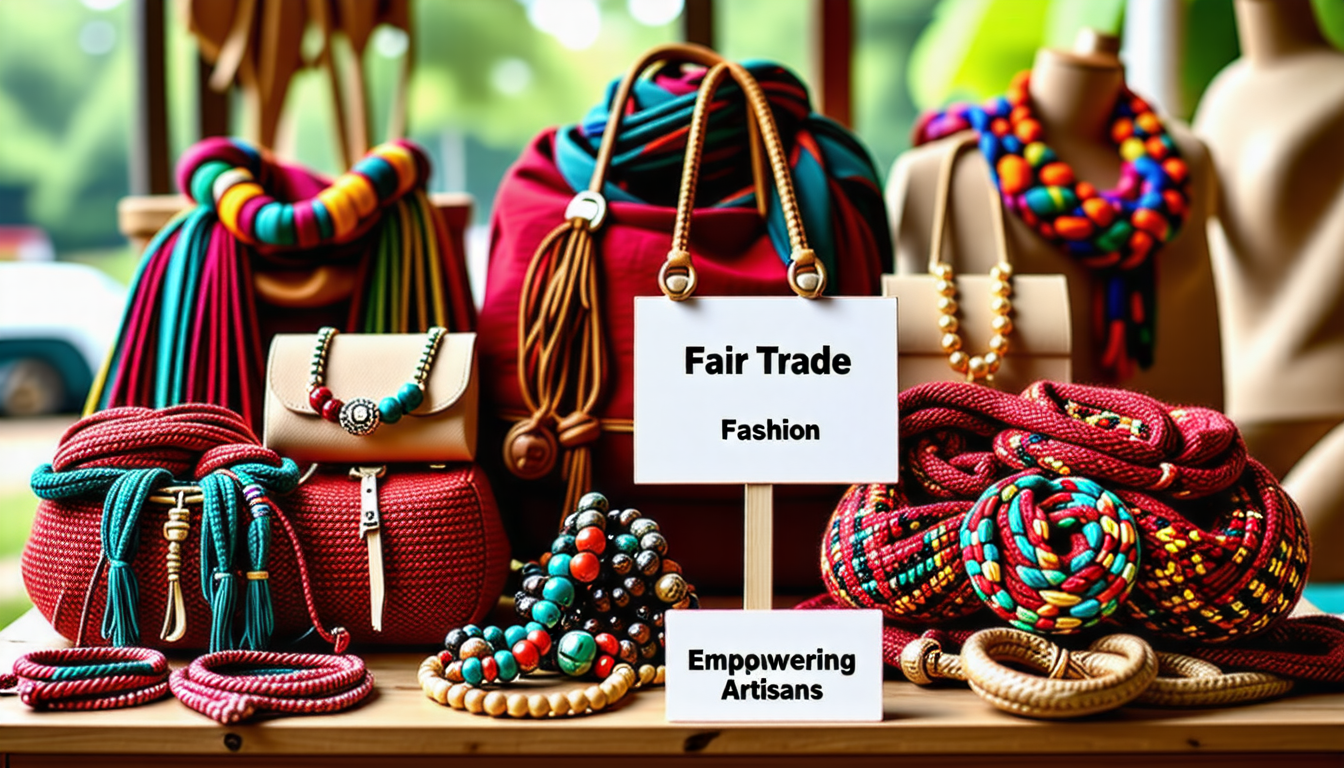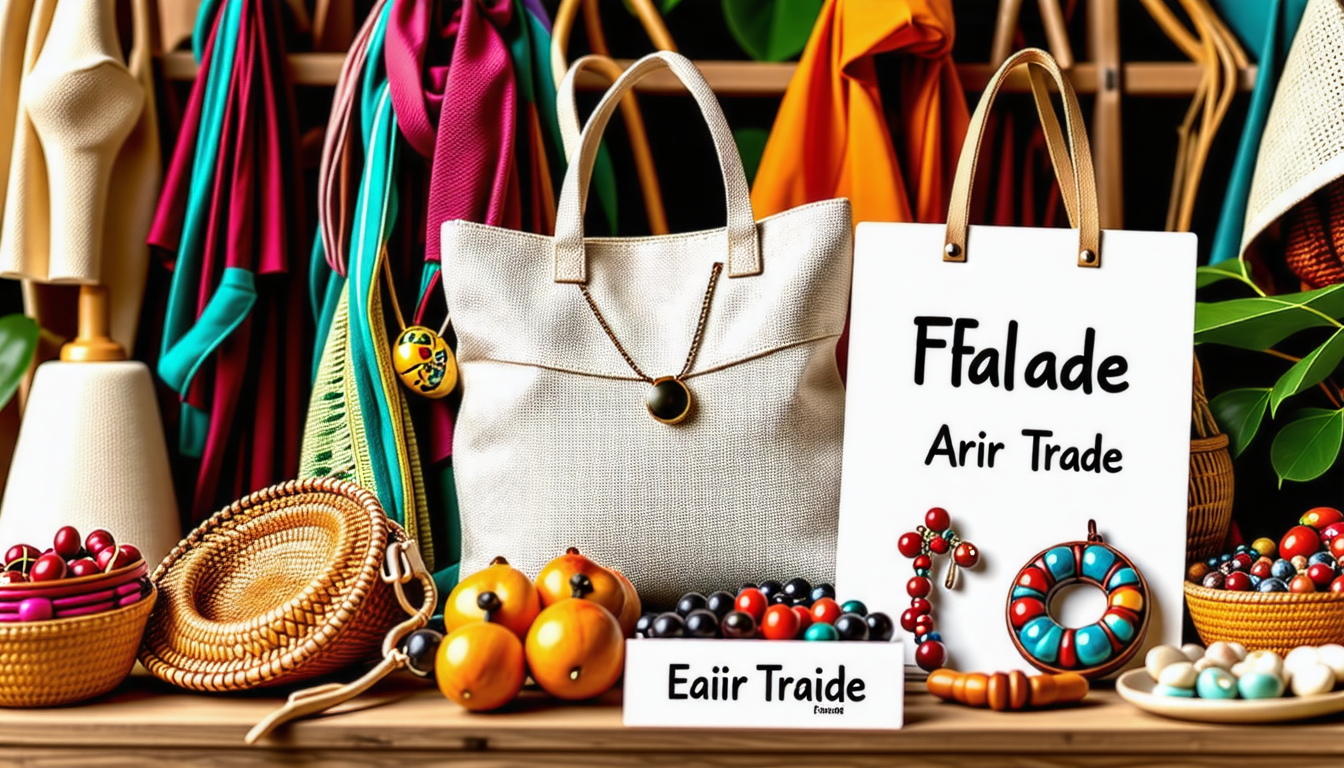|
IN BRIEF
|
In a world where trends shift faster than the seasons, fair trade fashion accessories emerge as a beacon of hope for the environmentally-minded consumer. By embracing these remarkable pieces, we not only elevate our style but also contribute to a significant change in the fashion industry. Crafted with ethical practices and eco-friendly materials, these accessories tell a tale of sustainability, where each bag, necklace, or scarf carries the weight of responsibility. As consumers increasingly demand transparency and accountability, fair trade fashion paves the way for a more conscious approach to style. It empowers artisans, revives local economies, and champions social justice, making every purchase a step toward a brighter future. Let’s unravel the layers of impact these accessories have on the fabric of sustainable consumerism.

Fair Trade Fashion Accessories
Fashion accessories play a pivotal role in how we express our individual style, but their environmental and social impact often goes unnoticed. Fair trade fashion accessories not only enhance aesthetics but also promote responsibility and sustainability. They are crafted with ethical practices that respect both the planet and the people involved in their production, creating a ripple effect that touches various aspects of consumerism.
Understanding Fair Trade
At its core, fair trade is a movement that strives to offer producers in developing countries fair prices and better working conditions. By purchasing fair trade accessories, consumers are partaking in a system that values social responsibility, promotes community development, and boosts economic sustainability. This initiative challenges the traditional fashion industry that often prioritizes profit over ethics.
The Importance of Ethical Sourcing
Ethical sourcing involves acquiring materials in a way that considers environmental and social impacts. Fashion brands that focus on fair trade adhere to strict guidelines that ensure sustainable practices, from organic cotton to recycled metals. These materials not only help mitigate the harmful effects of conventional fashion but also highlight the importance of minimizing reliance on virgin resources. By choosing fair trade accessories, consumers contribute to a cycle that supports the sustainable consumerism movement.
The Role of Sustainable Consumerism
Sustainable consumerism emphasizes purchasing behaviors that prioritize eco-friendly and ethically made products. As fast fashion continues to face scrutiny for its environmental toll, the demand for fair trade accessories is on the rise. This shift reflects a growing awareness about the origins of products and their impact on the world.
Consumer Behavior and Demand Trends
Recent studies show that consumer awareness is increasingly driving a demand for sustainable options, with a projected growth in interest possibly reaching 50%. Young, urban consumers are particularly attuned to sustainability, actively seeking alternatives to fast fashion that align with their values. This trend highlights a collective movement away from disposable fashion and towards more conscious choices.
Benefits of Fair Trade Fashion Accessories
The adoption of fair trade fashion accessories yields numerous benefits, not only for consumers but also for producers and the environment.
Supporting Local Communities
One key advantage of fair trade is that the profits directly benefit local communities. When consumers purchase fair trade accessories, they help empower artisans who receive fair payment for their craftsmanship. This supports community development initiatives and education projects, enabling local populations to thrive.
Reducing Environmental Impact
Fair trade accessories often utilize eco-friendly materials and sustainable practices throughout their lifecycle. For instance, organic cotton requires less water compared to conventional cotton and avoids toxic pesticides that harm the environment. These practices help in lowering the overall carbon footprint of the fashion industry.
Promoting Social Responsibility
By investing in fair trade fashion accessories, consumers can champion social justice and equitable trade practices. Most fair trade organizations ensure that artisans work in safe and healthy environments, enhancing their quality of life. The emphasis on social responsibility contributes to a more equitable global economy, directly impacting those who create the products.
Barriers to Sustainable Consumption
Despite the numerous benefits associated with fair trade accessories, several barriers still exist that hinder wider consumer adoption.
Awareness and Accessibility
Many consumers remain unaware of the significance and availability of fair trade fashion accessories. This lack of awareness means that even those who prioritize sustainable living may unknowingly choose conventional options. Brands have the responsibility to bridge this gap by marketing their values more effectively, highlighting the stories behind their products.
Cost Considerations
Often, fair trade accessories come at a higher price point due to the ethical standards upheld in their production. While it’s true that fair wages and sustainable materials can make products more expensive, many consumers may struggle to justify this increase. However, the long-term benefits of investing in quality, ethical accessories that last significantly outweigh initial costs.
The Future of Fair Trade Fashion Accessories
The future looks promising for fair trade fashion, particularly as consumers become increasingly aware of the implications of their purchases.
Innovations in Sustainable Materials
As awareness grows, there is also a rise in innovative alternatives, such as vegan leather and sustainably sourced textiles. These advancements not only diversify the options available to consumers but also provide more opportunities for artisans to showcase their skills using eco-friendly creations. The evolution of materials will play a fundamental role in attracting a more extensive consumer base.
Impact of Consumer Choices on Brand Practices
Brands are evolving as a direct response to consumer demands. Many established labels are introducing fair trade lines, catering to a market that increasingly prioritizes transparency and ethical production processes. This shift illustrates the power of consumer choices and their capacity to influence larger fashion brands to adopt more sustainable practices.
Incorporating Fair Trade Accessories Into Your Wardrobe
As a consumer, incorporating fair trade fashion accessories into your wardrobe can be both a stylish and responsible choice.
Exploring Local Artisans
One fantastic way to embrace sustainable consumerism is to seek out local artisans at craft fairs or online marketplaces. Supporting local talents ensures that funds circulate within the community. Also, these unique pieces add character and depth to your style while promoting the handcrafted movement.
Researching Brands Committed to Fair Trade
When shopping, researching brands that practice fair trade or have certifications can help streamline your choices. Many online retailers and websites curate lists of sustainable brands that reflect ethical principles, making it easier to make informed decisions. By supporting these companies, consumers can help strengthen the the fair trade movement.
Practicing Sustainable Consumption Habits
Being mindful of your consumption habits is vital in promoting sustainable consumerism. Instead of impulsive purchases, consider building a capsule wardrobe with versatile, timeless accessories that reflect your unique style. This approach encourages a more thoughtful relationship with fashion and its impact on society and the environment.
The Ripple Effect of Fair Trade Fashion
Each purchase of fair trade accessories sends a message that values ethics over conformity. This mindset fosters a community of conscious consumers who prioritize sustainable choices, influencing others to follow suit.
Educating Others on Sustainable Choices
Sharing knowledge about fair trade and sustainable practices with friends and family can amplify the impact of individual choices. Hosting discussions or recommending resources can motivate more people to make informed decisions, contributing to a larger movement towards responsible fashion consumption.
The Significance of Your Vote as a Consumer
Every purchase is a vote for the kind of world you want to support. By choosing fair trade fashion accessories, you advocate for a fairer, more sustainable future. These choices reflect not just personal values but also the growing demand for change in the fashion industry.
Ultimately, by understanding the significance of fair trade fashion accessories, consumers can harness their purchasing power to promote positive change in the industry. These accessories transform the landscape of sustainable fashion, paving the way for a brighter, more ethical future.

Fair trade fashion accessories play a crucial role in promoting sustainable consumerism. By choosing items made from eco-friendly materials and produced under ethical conditions, consumers significantly impact both the environment and the lives of artisans. For instance, sustainable accessories often utilize materials such as organic cotton, recycled metals, and cork. These materials reduce the reliance on virgin resources, thereby mitigating the negative impact of conventional fashion practices.
Moreover, recent studies indicate that consumer demand for sustainable fashion is on the rise, with projections suggesting that it could soar by 50% within the next few years. This shift illustrates a growing awareness among shoppers regarding the importance of sustainability in their purchasing decisions. Emphasizing fair trade principles ensures that creators receive fair compensation while maintaining high-quality standards, which ultimately enhances the value of the products.
Additionally, incorporating sustainable fashion accessories into our wardrobes can help foster a slow-fashion movement, countering the harmful effects of fast fashion. As the industry begins to adopt ethical practices, consumers can contribute to this transformation by making informed choices and prioritizing brands that reflect their values.

In the ever-evolving landscape of fashion, fair trade fashion accessories stand out as a beacon of hope for sustainable consumerism. These accessories, crafted with care and respect for both people and the planet, not only elevate our style but also tell a story of ethical production. As consumers become more conscious of their choices, the rising demand for sustainable accessories reflects a broader shift towards responsible consumption practices. By embracing these products, we play an active role in supporting communities and promoting an environmentally-friendly industry. Each purchase becomes a statement, making fashion not just an expression of individuality, but a commitment to sustainability. Together, we can fashion a future that values social equity and a healthier planet.
FAQ
What are fair trade fashion accessories?
R: Fair trade fashion accessories are products that are made under fair labor conditions and ethical practices. They ensure that artisans and workers receive fair wages and work in a safe environment, promoting social equity and ecological sustainability.
How do fair trade accessories contribute to sustainability?
R: These accessories help reduce environmental impact by using sustainable materials and eco-friendly production methods. They often prioritize renewable resources, thus lowering reliance on depleting natural resources.
Can fair trade fashion accessories influence consumer behavior?
R: Yes, as awareness of environmental and social issues grows, more consumers are inclined to choose fair trade options. This shift in consumer behavior drives brands to prioritize sustainability and ethical considerations in their product offerings.
What is the difference between fair trade and conventional fashion accessories?
R: The main difference lies in the ethical production practices. Fair trade accessories ensure that workers are treated fairly and sustainably, whereas conventional fashion often prioritizes low costs, leading to exploitation and environmental degradation.
How can I identify fair trade fashion accessories?
R: Look for certifications and labels that indicate the product meets fair trade standards. Additionally, research brands that are transparent about their sourcing and production practices, ensuring they align with sustainable consumerism.


